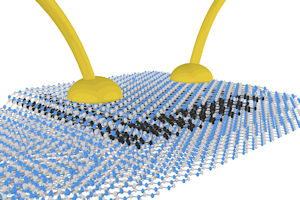A research team at the University of Manchester have developed of a number of novel 2D materials similar to graphene.
 The team created devices to stablise 2D materials
The team created devices to stablise 2D materials
It will be possible to produce designer materials with exotic properties from these atomically thin 2D crystals. However, for most of these 2D crystals, their stability in air is a major concern. As a result, these materials are highly reactive, and decompose before their properties can be determined, thus posing a difficulty in identifying their potential applications.
In the study paper, which appeared in NanoLetters, the research team at the University of Manchester demonstrated how these previously inaccessible materials can become useful materials with the help of tailored fabrication techniques.
For the first time, the research team, headed by Dr Roman Gorbachev, has succeeded in isolating a single atomic layer by using more stable 2D materials like graphene for computer-controlled protection of these new reactive crystals in a specifically designed inert gas chamber. Integrating different 2D materials in thin stacks provides researchers with the option to control material properties, thereby enabling ‘materials-to-order’ which can satisfy industrial requirements.
The new research holds promise for a number of applications, including lightweight batteries for portable energy storage, and high-frequency electronics for supporting satellite communications. The innovation also paves the way for the analysis of a myriad of atomically thin materials and their application as building blocks for the fabrication of multilayer devices with custom-made properties.
The research group applied its innovative fabrication technique on niobium diselenide and black phosphorus, which fail to maintain their stability in air. These 2D crystals have been the subject of vast research in the last 12 months. The breakthrough fabrication technique enables the exotic properties to be revealed, and outstanding electronic properties of these air-sensitive 2D crystals.
In 2004, a University of Manchester team headed by Sir Andre Geim and Sir Kostya Novoselov first isolated graphene. This effort has resulted in the development of a variety of 2D materials with specific features and properties.
Dr Gorbachev said, “This is an important breakthrough in the area of 2D materials research, as it allows us to dramatically increase the variety of materials that we can experiment with using our expanding 2D crystal toolbox”.
“The more materials we have to play with, the greater potential there is for creating applications that could revolutionise the way we live.” Sir Andre Geim added.